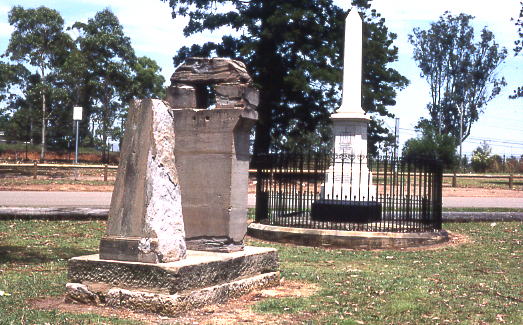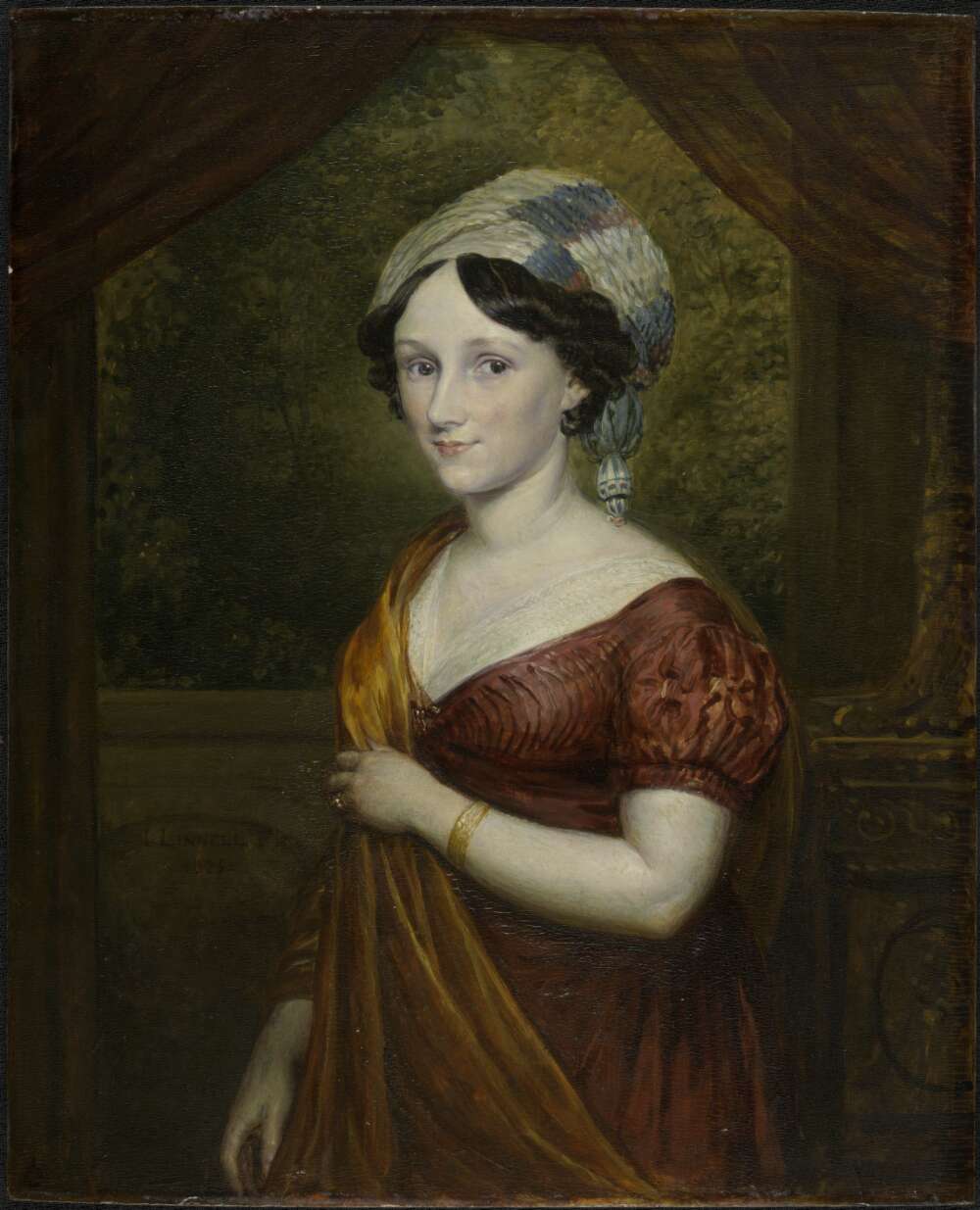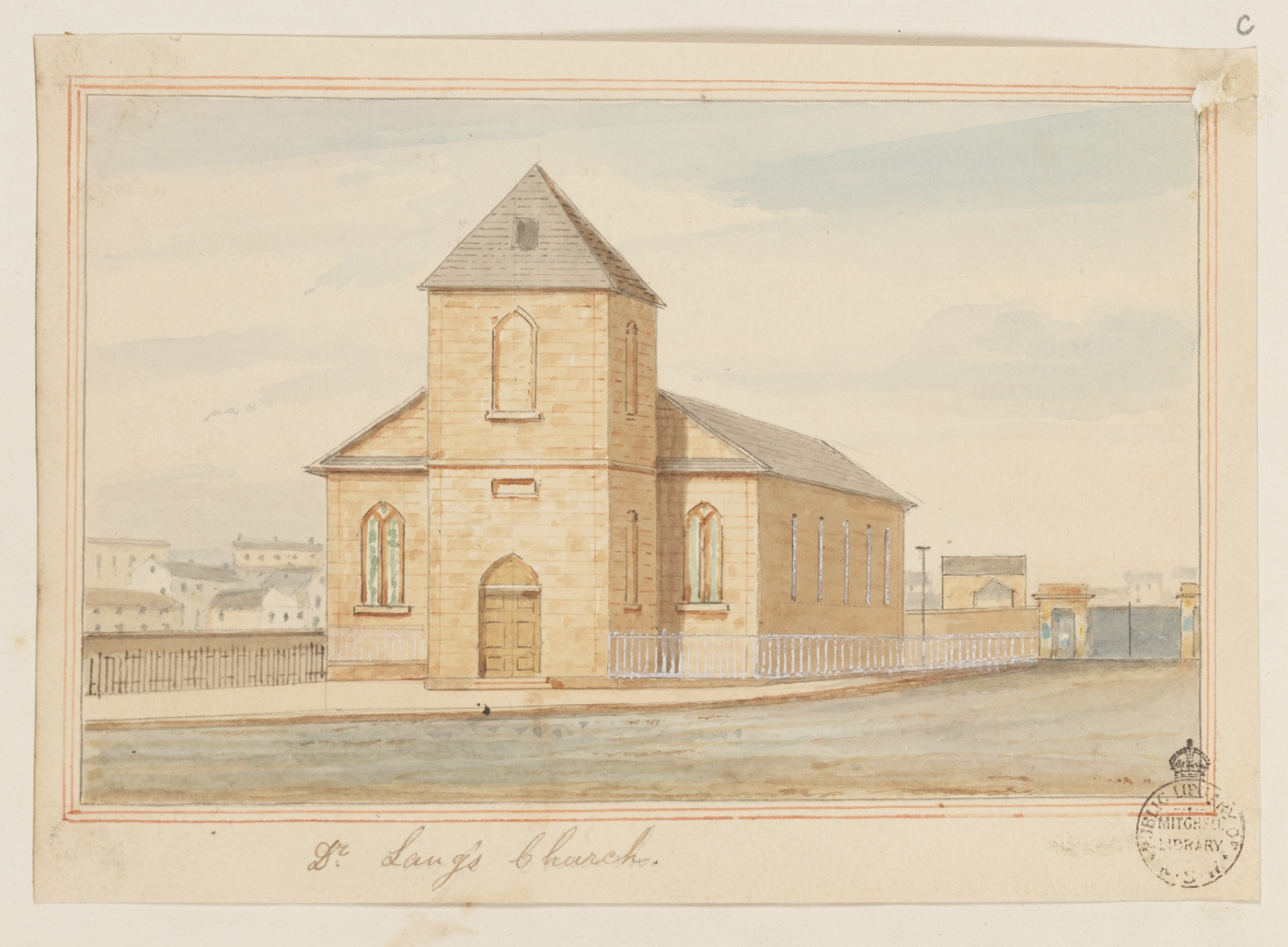|
Lancelot Threlkeld
Lancelot Edward Threlkeld (20 October 1788 – 10 October 1859) was an English missionary, primarily based in Australia. He was married twice and survived by sons and daughters from both marriages. Thelkeld is known for his work with Biraban in recording and publishing English translations of the Awabakal language. Early life Born in Southwark, England, now in south London, on 20 October 1788, Threlkeld was son of Samuel Joseph Threlkeld, a brush-maker, and his wife Mary. In 1813 he began training as an evangelical missionary with the London Missionary Society (LMS). His missionary career began in 1814, with an assignment to the Society Islands. Missionary life Evangelist Threlkeld was well educated, and on 8 November 1815 sailed for Tahiti, but the illness and subsequent death of a child of his detained him for a year in Rio de Janeiro, where he started a Protestant church. He left for Sydney on 22 January 1817, arrived on 11 May, and after a short stay went to the South Sea I ... [...More Info...] [...Related Items...] OR: [Wikipedia] [Google] [Baidu] |
Missionary
A missionary is a member of a Religious denomination, religious group which is sent into an area in order to promote its faith or provide services to people, such as education, literacy, social justice, health care, and economic development.Thomas Hale 'On Being a Missionary' 2003, William Carey Library Pub, . In the Bible translations into Latin, Latin translation of the Bible, Jesus, Jesus Christ says the word when he sends the disciples into areas and commands them to preach the gospel in his name. The term is most commonly used in reference to Christian missions, but it can also be used in reference to any creed or ideology. The word ''mission'' originated in 1598 when Jesuits, the members of the Society of Jesus sent members abroad, derived from the Latin (nominative case, nom. ), meaning 'act of sending' or , meaning 'to send'. By religion Buddhist missions The first Buddhist missionaries were called "Dharma Bhanaks", and some see a missionary charge in the symbolis ... [...More Info...] [...Related Items...] OR: [Wikipedia] [Google] [Baidu] |
Thomas Brisbane
Major General Sir Thomas Makdougall Brisbane, 1st Baronet, (23 July 1773 – 27 January 1860), was a British Army officer, administrator, and astronomer. Upon the recommendation of the Duke of Wellington, with whom he had served, he was appointed governor of New South Wales from 1821 to 1825. A keen astronomer, he built the colony's second observatory and encouraged scientific and agricultural training. Rivals besmirched his reputation and the British Secretary of State for the Colonies, Lord Bathurst, recalled Brisbane and his colonial secretary Frederick Goulburn. Brisbane, a new convict settlement, was named in his honour and is now the 3rd largest city in Australia. Early life Brisbane was born at Brisbane House in Noddsdale, near Largs in Ayrshire, Scotland, the son of Sir Thomas Brisbane and his wife Eleanora (née Bruce). He was educated in astronomy and mathematics at the University of Edinburgh. He joined the British Army's 38th (1st Staffordshire) Regiment of Foot ... [...More Info...] [...Related Items...] OR: [Wikipedia] [Google] [Baidu] |
Ethnological Society Of London
The Ethnological Society of London (ESL) was a learned society founded in 1843 as an offshoot of the Aborigines' Protection Society (APS). The meaning of ethnology as a discipline was not then fixed: approaches and attitudes to it changed over its lifetime, with the rise of a more scientific approach to human diversity. Over three decades the ESL had a chequered existence, with periods of low activity and a major schism contributing to a patchy continuity of its meetings and publications. It provided a forum for discussion of what would now be classed as pioneering scientific anthropology from the changing perspectives of the period, though also with wider geographical, archaeological and linguistic interests. In 1871 the ESL became part of what now is the Royal Anthropological Institute of Great Britain and Ireland, merging back with the breakaway rival group the Anthropological Society of London. Background At the time of the Society's foundation, "ethnology" was a neologism. The ... [...More Info...] [...Related Items...] OR: [Wikipedia] [Google] [Baidu] |
Christianity
Christianity is an Abrahamic monotheistic religion based on the life and teachings of Jesus of Nazareth. It is the world's largest and most widespread religion with roughly 2.38 billion followers representing one-third of the global population. Its adherents, known as Christians, are estimated to make up a majority of the population in 157 countries and territories, and believe that Jesus is the Son of God, whose coming as the messiah was prophesied in the Hebrew Bible (called the Old Testament in Christianity) and chronicled in the New Testament. Christianity began as a Second Temple Judaic sect in the 1st century Hellenistic Judaism in the Roman province of Judea. Jesus' apostles and their followers spread around the Levant, Europe, Anatolia, Mesopotamia, the South Caucasus, Ancient Carthage, Egypt, and Ethiopia, despite significant initial persecution. It soon attracted gentile God-fearers, which led to a departure from Jewish customs, and, a ... [...More Info...] [...Related Items...] OR: [Wikipedia] [Google] [Baidu] |
Watsons Bay
Watsons Bay is a harbourside, eastern suburb of Sydney, in the state of New South Wales, Australia. Watsons Bay is located 11 km north-east of the Sydney central business district, in the local government area of the Municipality of Woollahra. Watsons Bay sits on the end of the South Head peninsula and takes its name from the sheltered bay and anchorage on its western side, in Port Jackson (Sydney Harbour). It provides views across the harbour to the Sydney Harbour Bridge. The Gap is an ocean cliff on the eastern side with views to Manly at North Head and the Pacific Ocean. Vaucluse is the only adjacent suburb, to the south. History Aboriginal history The original inhabitants of the area that is now known as Watsons Bay, were the Cadigal people. The Cadigal referred to the area as Kutti. This indigenous group of people fished and collected shellfish in the waters and bays off South Head. They acquired their resources from Camp Cove and carved rock engravings there, which ... [...More Info...] [...Related Items...] OR: [Wikipedia] [Google] [Baidu] |
George Washington Walker
George Washington Walker (19 March 1800 – 2 February 1859) was an English-born Australian missionary for the church called Religious Society of Friends, or Quakers. Walker was born to Unitarian parents in London, the twenty-first child of John Walker by his second wife, Elizabeth. He was educated at a school in Barnard Castle. He was introduced to the Society of Friends in his teenage years when he worked in Newcastle for a linen draper who was a Quaker, but Walker did not become a Quaker himself until 1827. Walker also participated in the temperance movement. Walker met his future missionary partner James Backhouse in 1820 or 1821. Between September 1831 and February 1832, Walker and Backhouse travelled from England to Hobart, Van Diemen's Land (modern Tasmania). Between 1832 and 1838, they made a tour of the penal settlements in Australia, Van Diemen's Land, and Norfolk Island. Between 1838 and 1840, they left Australia and did missionary work in Mauritius and South Afri ... [...More Info...] [...Related Items...] OR: [Wikipedia] [Google] [Baidu] |
James Backhouse
:''See alsfor two other James Backhouse botanists and nursery owners of York.'' James Backhouse (8 July 1794 – 20 January 1869) was a botanist and missionary for the Quaker church in Australia. His son, also James Backhouse (1825–1890), was also a botanist. Early life in England James Backhouse was born in 1794, the fourth child of James and Mary Backhouse a Quaker business family of Darlington, County Durham, England. He was the third after his father and grandfather to be called James Backhouse. His grandfather died as a Quaker prisoner and martyr at Lancaster Castle in 1697. His father, James, (together with his father and brother), founded the Backhouse's Bank in Darlington. His mother was Mary Dearman of Thorne, Yorkshire, also a devout Quaker. His father died when he was a child and his mother brought him up in a religious atmosphere. He was educated in Leeds and began work in a grocery, drug and chemical business, but he developed tuberculosis and became too delicate ... [...More Info...] [...Related Items...] OR: [Wikipedia] [Google] [Baidu] |
Secretary Of State For The Colonies
The secretary of state for the colonies or colonial secretary was the Cabinet of the United Kingdom, British Cabinet government minister, minister in charge of managing the United Kingdom's various British Empire, colonial dependencies. History The position was first created in 1768 to deal with the increasingly troublesome Thirteen colonies, North American colonies, following passage of the Townsend Acts. Previously, colonial responsibilities were held jointly by the Board of Trade, lords of trade and plantations and the Secretary of State for the Southern Department, secretary of state for the Southern Department, who was responsible for Ireland, the American colonies, and relations with the Roman Catholicism in Europe, Catholic and Islam in Europe, Muslim states of Europe, as well as being jointly responsible for domestic affairs with the Secretary of State for the Northern Department. Joint responsibility continued under the secretary of state for the colonies, but led to a ... [...More Info...] [...Related Items...] OR: [Wikipedia] [Google] [Baidu] |
Ralph Darling
General Sir Ralph Darling, GCH (1772 – 2 April 1858) was a British Army officer who served as Governor of New South Wales from 1825 to 1831. He is popularly described as a tyrant, accused of torturing prisoners and banning theatrical entertainment. Local geographical features named after him include the Darling River and Darling Harbour in Sydney. Early career Darling seems to have been unique in the British Army of this period, as he progressed from an enlisted man to become a general officer with a knighthood. Born in Ireland, he was the son of a sergeant in the 45th Regiment of Foot who subsequently gained the unusual reward of promotion to officer rank as a lieutenant. Like most of the small number of former non-commissioned officers in this position, Lieutenant Darling performed only regimental administrative duties. He struggled to support his large family on a subaltern's pay. Ralph Darling enlisted at the age of fourteen as a private in his father's regiment, and ser ... [...More Info...] [...Related Items...] OR: [Wikipedia] [Google] [Baidu] |
John Dunmore Lang
John Dunmore Lang (25 August 1799 – 8 August 1878) was a Scottish-born Australian Presbyterian minister, writer, historian, politician and activist. He was the first prominent advocate of an independent Australian nation and of Australian republicanism. Background and family Lang was born near Greenock, Renfrewshire (now Inverclyde), Scotland, the eldest son of William Lang and Mary Dunmore. His father was a small landowner and his mother a pious Presbyterian, who dedicated her son to the Church of Scotland ministry from an early age. He grew up in nearby Largs and was educated at the school there and at the University of Glasgow, where he excelled, winning many prizes and graduating as a Master of Arts in 1820. Stevenson McGill was his most influential teacher; he also greatly admired Thomas Chalmers. His brother, George, had found employment in New South Wales and Lang decided to join him. He was ordained by the Presbytery of Irvine on 30 September 1822. Arriving in Sydney ... [...More Info...] [...Related Items...] OR: [Wikipedia] [Google] [Baidu] |
Samuel Marsden
Samuel Marsden (25 June 1765 – 12 May 1838) was an English-born priest of the Church of England in Australia and a prominent member of the Church Missionary Society, believed to have introduced Christianity to New Zealand. Marsden was a prominent figure in early New South Wales and Australian history, partly through his ecclesiastical offices as the colony's senior Church of England cleric and as a pioneer of the Australian wool industry, but also for his employment of convicts for farming and his actions as a magistrate at Parramatta, both of which attracted contemporary criticism. Early life Born in Farsley, near Pudsey, Yorkshire in England as the son of a Wesleyan blacksmith turned farmer, Marsden attended the village school and spent some years assisting his father on the farm. In his early twenties his reputation as a lay preacher drew the attention of the evangelical Elland Society, which sought to train poor men for the ministry of the Church of England. With a scho ... [...More Info...] [...Related Items...] OR: [Wikipedia] [Google] [Baidu] |
New Testament
The New Testament grc, Ἡ Καινὴ Διαθήκη, transl. ; la, Novum Testamentum. (NT) is the second division of the Christian biblical canon. It discusses the teachings and person of Jesus, as well as events in first-century Christianity. The New Testament's background, the first division of the Christian Bible, is called the Old Testament, which is based primarily upon the Hebrew Bible; together they are regarded as sacred scripture by Christians. The New Testament is a collection of Christian texts originally written in the Koine Greek language, at different times by various authors. While the Old Testament canon varies somewhat between different Christian denominations, the 27-book canon of the New Testament has been almost universally recognized within Christianity since at least Late Antiquity. Thus, in almost all Christian traditions today, the New Testament consists of 27 books: * 4 canonical gospels (Matthew, Mark, Luke, and John) * The Acts of the Apostl ... [...More Info...] [...Related Items...] OR: [Wikipedia] [Google] [Baidu] |


.jpg)



.jpg)
